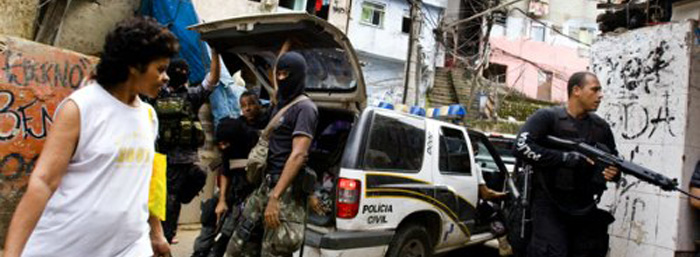Clashes last week between favela residents and police in Rio de Janeiro led to flaming barricades, the partial shutdown of the iconic Copacabana neighborhood, and at least one shooting victim. Less than six weeks from the start of the World Cup, Rio and its slums appear to be teetering on the brink of chaos.
Favela residents say they’re protesting human rights violations on the part of police forces. Meanwhile, drug dealers are regaining territory amid the chaos, and authorities are leaning on military reinforcements to keep order. Also caught in the crossfire? A much-lauded urban policy called Pacification Police Units (UPP).
The UPP program, initiated in 2008, represented a paradigm shift in policing attitudes towards Rio’s favelas. Prior to the establishment of UPP, police traditionally only entered these areas for targeted operations, with little regard for residents. The UPP concept put in place community-oriented approaches to policing in the city’s poorest neighborhoods, first by wresting control of the favelas from drug gangs, and then by embedding new police units in those areas.
Key to these new units was that they were to be composed of fresh recruits, untainted by the rampant corruption associated with existing forces, and specially trained in human rights and community outreach. Broadly speaking, the policy has been seen as a success. There are now 37 new police posts operating across Rio’s favelas, working with an estimated 1.5 million residents. The city’s homicide rate dropped by 65 percent between 2008 and 2012. A 2012 review estimated that about 60 deaths per 100,000 inhabitants are prevented yearly in each UPP favela.
And yet, here is Rio, seething, at precisely the moment it finds itself in the international spotlight. Crime and homicide rates have started to creep back up. Nineteen Rio police officers have been killed so far in 2014, more than were killed in all of 2013.
Residents and policy experts point to a number of reasons why the UPP program, once held up as a massive success, now appears to be stumbling.

A major flashpoint was the alleged torture and murder of Amarildo de Souza, a bricklayer taken in for questioning by the police in Rocinha, one of the city’s largest favelas. There was also the gruesome incident this March, of a woman hit by crossfire who was bundled into a police vehicle’s trunk and accidentally dragged down the road for nearly 300 yards. Last week’s protests were set off by the discovery of a young man’s corpse in a local daycare center. Neighbors told the local media he was killed by the police, and his mother says his body was covered in boot-marks. Cases like these have damaged the UPP’s image as having established a break with Rio’s long history of police brutality.
Another major problem is the unfulfilled social component of the policy. The whole concept of pacification, as the government presented it, was that it was supposed to be accompanied by social programs, including job training, health, and education initiatives. Administrators, residents and policy experts have bemoaned the slow pace of implementation for these programs in the first years of UPP. According to a World Bank study, it’s still unclear whether the multiplicity of post-pacification social programs are delivering benefits, and residents have mixed perceptions regarding their effectiveness. Experts across the board are pointing out that peace in favelas will depend on poverty reduction as well as getting rid of gangs.
Police crackdowns on popular street parties have added to the tension that has been periodically exploding in protests since last year. Fears that pacification will ultimately push out local residents, a favela version of gentrification, haven’t helped, either.
Sociologist Ignacio Cano, who led a widely cited 2012 evaluation of the UPP program, has said that few of his recommendations, which included more community engagement and clearer protocols for how authorities deal with street parties, have been carried out. The UPP program was left on “automatic pilot,” as he’s put it.
Or as Robson Rodrigues, former general coordinator of the Pacifying Police force, writes in an Inter-American Development Bank blog:
Notwithstanding the success of the UPPs, there is still some confusion about what it is and is not. There is an absence of clear formal program with defined objectives, goals, indicators and monitoring systems. Without more formalization, there is a risk that the UPP could turn into a kind of occupation by default. And it is this kind of occupation that is at the root of many contemporary challenges facing the UPP today.
With violence and discontent back on the rise, Rio’s authorities appear to be returning to old strategies, using military force against favela dwellers. In the context of the World Cup, the desire to keep the situation under tight control – and keep visitors safe – seems to be superseding the city’s long-term goal of integrating the favelas with the city proper.

